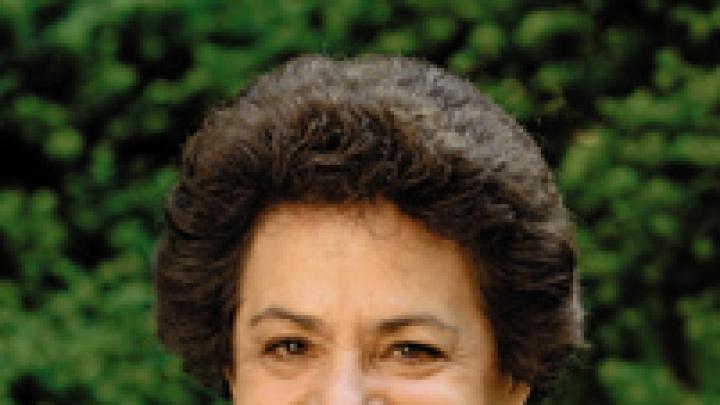President Drew Faust on April 28 appointed Higgins professor of natural sciences Barbara J. Grosz, a Harvard faculty member since 1986, to the deanship of the Radcliffe Institute for Advanced Study (RIAS). Grosz has been serving as interim dean since July 1, 2007; she thus was the temporary, and now becomes the regular, successor in that post to Faust, who was the institute's dean until her appointment as the University's president last year. In making the announcement, Faust said in a statement, “Radcliffe has flourished this past year under Barbara Grosz’s leadership, and her lively mind, her scholarly distinction, her deep sense of institutional commitment, and her talent for creating intellectual communities and connections are sure to help the Institute thrive in the years to come. Barbara has been one of the institute’s principal architects from its beginnings, and she is exceptionally well positioned both to guide its next phase and to strengthen its bonds with other parts of Harvard across a wide span of fields. It will be a pleasure to continue working with her, and to continue supporting the important and imaginative work of Radcliffe’s scholars and the vital role the Institute plays at Harvard.”
Grosz’s appointment, securing the transition in Radcliffe’s leadership, came at a symbolically important time. Later the same day, the Institute was scheduled to host a reading and lecture by poet Adrienne Rich ’51, Litt.D. ’90, one of Radcliffe College's most distinguished alumnae and an example of the caliber of the presentations the institute has offered the larger University community. And across Radcliffe Yard, the renovation of Byerly Hall is scheduled for completion in time to bring Institute fellows’ offices and studios onto the campus in one place, beginning this autumn—a tangible sign of the institution's ambitions to foster its distinctive brand of high-level, interdisciplinary advanced study as a central part of Harvard’s agenda.
Grosz, a computer scientist who was recently elected to membership in the National Academy of Engineering, first deeply engaged in the institute’s leadership as the RIAS dean of science, beginning in 2001. She helped make it possible for laboratory-based researchers to assume Radcliffe fellowships by arranging for them to hold part-year appointments, to travel back to their home laboratories as needed, or to collaborate with Harvard scientists. Clusters of fellows in related fields—cosmology, for instance, and in the current academic year, computer modeling of music—were appointed, to enable them to work together fruitfully during their year of Radcliffe residence. Grosz’s Radcliffe home page and biography are available at www.radcliffe.edu/about_the_institute.aspx. Her research, which focuses on artificial intelligence, is described in detail at her School of Engineering and Applied Sciences home page, at www.eecs.harvard.edu/grosz.
In her decanal letter in the 2006-2007 RIAS annual report, composed last August (www.radcliffe.edu/documents/AnnualReport2007GREY.pdf), Grosz wrote:
Each September, in greeting fellows at orientation as dean of science, I have reassured nonscientists that they would be able to follow talks by science fellows and encouraged them to attend these talks. I have urged them as well to take care in explaining their work, to say what they mean when they use such words as representation, theory, model, and excellence—words that have very different meanings in different fields—so that their work would be accessible to their colleagues in other fields. It was thus delightful to hear one of this year's humanists say, “I had not realized how wonderful a jargon-free year was until I attended a conference in my field in the spring.”
The inclusion of artists in the fellowship class—which makes Radcliffe unique among the nation's institutes for advanced study—plays an essential role in the class's intellectual dynamic. [One humanist fellow, a social historian] said, “The various presentations by our artist-members (painters, novelists, poets) were especially inspiring—perhaps because they were/are least familiar in the regular round of my experience.” Many fellows from fields outside the arts report that their richest intellectual exchanges and collaborations are with artists. Artists, too, benefited from the presence of those in other disciplines.
Grosz’s interdisciplinary and University-wide engagements have included membership on the Standing Committee on Athletics, on the Faculty of Arts and Sciences’ Faculty Council, and on the Harvard University Science and Engineering Committee (the planning and coordinating body for interdisciplinary, interschool scientific collaboration). She also has led the effort to increase the participation of women in science; most prominently, in 2005, she chaired the Task Force for Women in Science and Engineering, which recommended ways to strengthen the “pipeline” of women pursuing academic careers in science at Harvard, from the College to advancement through faculty ranks (see “Engineering Equity,” July-August 2005).
For the text of the official announcement of Grosz’s appointment as Radcliffe dean, see here.









